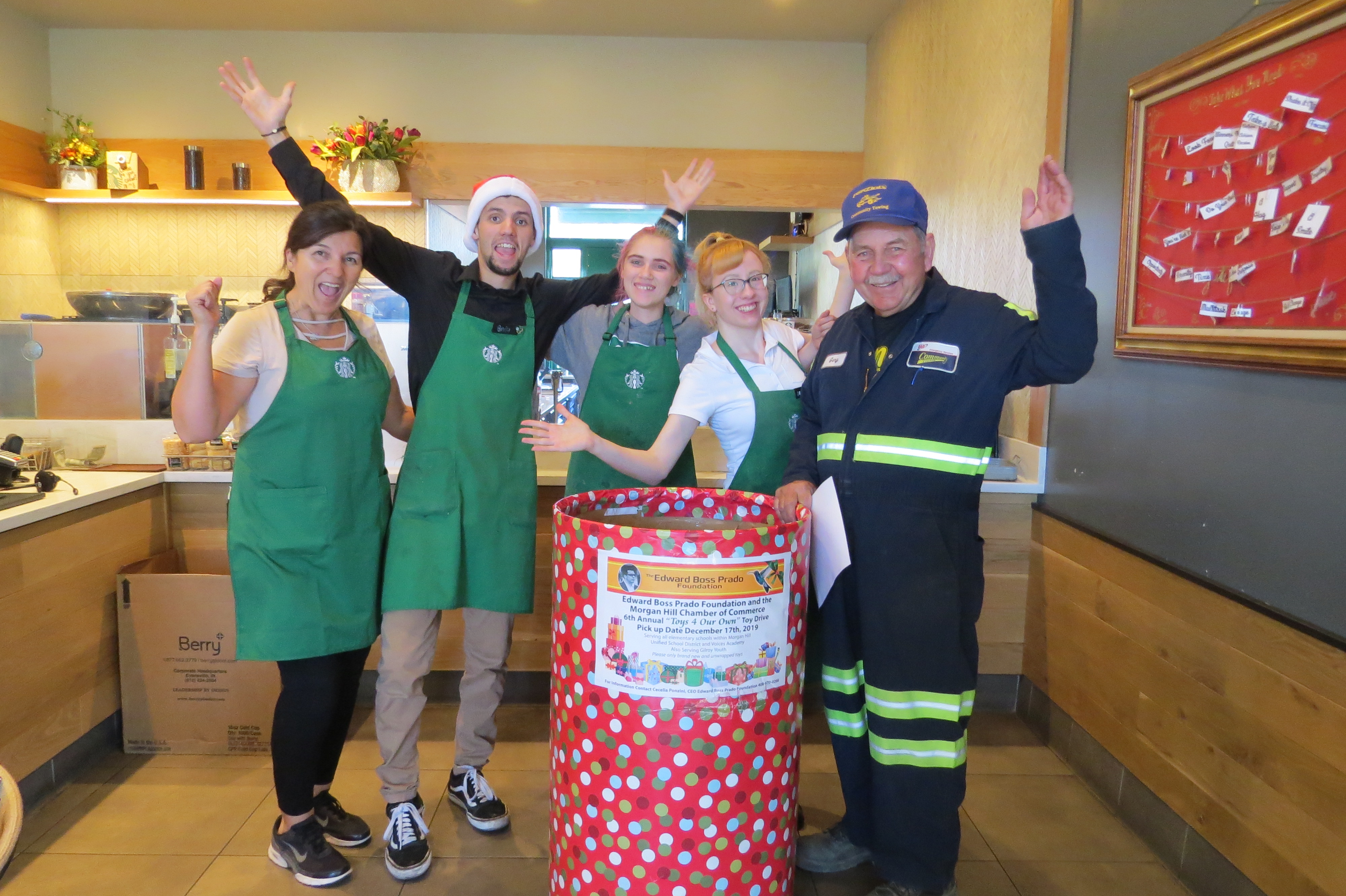We encourage parents to show their children a generous nature

Starbucks employees and Gary Ponzini, with the Edward Boss Prado Foundation, set up a barrel to collect canned food and toys for local families in need. – Photo by Marty Cheek
Opinion: Gilroy Life
Charles Dickens’ beloved story “A Christmas Carol” holds an important lesson for all of us. During the holidays, many Americans are seduced by the materialism of our modern world. We would be happier if we focused less on ourselves and more on those people who need our help.
In the next several weeks, South Valley residents will spend hours shopping at stores or online finding the toys, food and other items that we hope will fill the hearts of our loved ones with joy. Every year with the Black Friday sales in major retail stores, the news shows people fighting for items. That’s indeed an irony at a time of year devoted to celebrating the birth of the man Christians consider the Prince of Peace. Somehow, after all the wrapping and ribbons and bows are thrown into the garbage, our devotion to “stuff” fails to make us truly happy.
At the start of the novella Ebenezer Scrooge is a man who, like many Americans, is devoted to materialism. His heart is a cold one. In his counting house, he lives a lonely life filled with deep cynicism toward the human race. His lack of compassion has made him blind to the burdens of hunger and poverty that many of his fellow Londoners are forced to carry. Despite his wealth, he is a bitter, unhappy man. But, spoiler alert, after being forced by three spirits to see his past, present and future selves, the soul of Mr. Scrooge by the end of the story is transformed. He awakes on Christmas morning with the wisdom that every time we help others, we take a step down the path to true happiness.
 Dickens might be pleased to see science proves his point in “A Christmas Carol.” There is a correlation between altruism and happiness. Giving to others actives an area of the brain linked with contentment and the reward cycle. Professors Phillipe Tobler and Ernst Fehr, researchers at the University of Zurich in Switzerland, studied the human brain in an experiment to find out what happens when we perform a generous act. Regardless of the act’s size the decision to be altruistic, they found, ignites specific neural mechanisms that create a “warm glow” inside us.
Dickens might be pleased to see science proves his point in “A Christmas Carol.” There is a correlation between altruism and happiness. Giving to others actives an area of the brain linked with contentment and the reward cycle. Professors Phillipe Tobler and Ernst Fehr, researchers at the University of Zurich in Switzerland, studied the human brain in an experiment to find out what happens when we perform a generous act. Regardless of the act’s size the decision to be altruistic, they found, ignites specific neural mechanisms that create a “warm glow” inside us.
We encourage parents during this holiday season to give their young children a gift that will last a lifetime — a lesson in generosity and sharing our material abundance. In the South Valley region during the next six weeks, you will see cardboard containers set up in various locations — by volunteers with the Edward Boss Prado Foundation and other groups — to collect canned food and toys for local people in need. Perhaps during a shopping excursion during this month, you can take time and some extra money to teach your children to consider the happiness of other people.
At the supermarket, give your child the adventure of finding canned foods that he or she can place in a container. At Target, Walmart or some of our small businesses, have your boy or girl select a special toy they think some child in a family with limited resources might like. Maybe even have them write a friendly note that they wish the child a happy holiday season and lots of fun playtime with the toy. And to encourage literacy, have your child pick out a fun book or two to give to other children through the annual Gift of Reading program conducted by the BookSmart Community Advantage nonprofit organization.
Childhood is the time we develop the character traits that will determine who we are as human beings. Unfortunately, many of us have developed selfish traits where we think about our happiness to the neglect of the happiness of those we share this planet with.
Like Mr. Scrooge in “”A Christmas Carol” discovered with a little other-worldly help, the holidays are a time to celebrate with family and friends what is good in our world. Let us this season of giving remember those who by fate or misfortune have found themselves in a financial struggle. A bit of generosity to our fellow humans can be spiritually enlightening.






